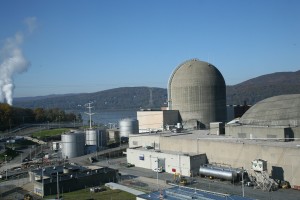Gov. Andrew M. Cuomo”™s office reiterated its opposition to Indian Point Energy Center”™s continued operation in a letter last week to the federal Nuclear Regulatory Commission as the nuclear power plant is the subject of a hearing this month on safety issues with the Atomic Safety and Licensing Board.
Jim Malatras, Cuomo”™s director of state operations, in a Nov. 16 letter outlined reasons the nuclear power plant in Buchanan operated by Entergy Corp. should be shut down.
“Indian Point”™s proximity to a major population center in New York City and surrounding areas ”” with more than 20 million people within 50 miles of the plant ”” makes it absolutely impossible to have an effective safety and evacuation plan,” Malatras wrote. “No plan to manage the age-related defects at these facilities can adequately protect the millions of New Yorkers living nearby.”
The letter was made public hours after a Nov. 16 rally in Tarrytown where union workers and business leaders banded together to support Indian Point”™s continued operation at the start of the agency”™s hearing on the plant. The rally was led by the Coalition of Labor for Energy & Jobs and New York Affordable Reliable Electricity Alliance.
“Indian Point provides critical power for the entire New York metropolitan region. It is important for our homes, business, mass transit system, hospitals and for New York”™s economic engine in general,” said Tom Ryan, president of Boilermakers Local 5 New York, which represents construction, repair and maintenance workers.
Indian Point provides about 25 percent of electricity to New York City and Westchester County, according to Entergy, and about 1,000 permanent jobs at the plant.
Since 2007, Entergy has sought to relicense the plant”™s two operating reactors, Unit 2 and Unit 3, but has been caught up in legal issues as the state and environmental organizations including Riverkeeper have opposed the license renewals.
If the plant”™s reactors are relicensed by the NRC, each reactor can operate for 20 more years. The reactors”™ first operating licenses were issued for a period of 40 years, but Unit 2”™s license expired in 2013 and that for Unit 3 will expire in December.
This month”™s five-day hearing at the DoubleTree Hotel in Tarrytown marks the second round of safety-related challenges made by the state and Riverkeeper.
Three judges with the Atomic Safety and Licensing Board, an independent adjudicatory body of the NRC, have reviewed testimonies provided by expert witnesses on issues raised regarding the reactors”™ pressure vessels, metal fatigue and other components related to the plant”™s aging infrastructure.
The hearing is being held to allow the judges to ask questions; they will rule on the issues at a later date.
On another regulatory front, the New York Department of State this month determined the Indian Point operation was not consistent with the state”™s coastal management policy. Certification by that state agency is needed before the federal Nuclear Regulatory Commission can act on Entergy”™s reactors license renewal.
The Department of State is in charge of New York”™s Coastal Management Program, which assures that projects in the state”™s coastal zones will not have harmful effects on water or land in those areas. The state determines whether projects in the coastal zone are consistent with policies protecting and preserving the area before granting a coastal certificate from the state.
Because Indian Point uses billions of gallons of water from the Hudson River daily to cool its reactor towers, Entergy is required to obtain the Coastal Management Program certificate.
Entergy initially sought a determination from the state that its plant operation is consistent with coastal management policy in 2012, but withdrew its application last year after learning that the NRC would be issuing a new environmental statement supplement for the Buchanan plant in September 2016.
“The withdrawal was made by Entergy in order to ensure that (the state Department of State) has the opportunity to review an update to the federally issued Final Supplemental Environmental Impact Statement,” according to a statement from Entergy.
Entergy has asked that the Department of State”™s Nov. 5 denial of the coastal certificate be considered invalid because the plant owner withdrew its application.
Entergy is also arguing in court that Indian Point was “grandfathered” into the Coastal Management Program because it received a coastal certificate in 1982 and therefore doesn”™t need a new one.
A state appellate court agreed with Entergy”™s grandfather clause argument in a 2014 decision, but the state appealed that ruling and the case is pending in New York”™s highest court, the Court of Appeals. That case will most likely be argued next year.

















